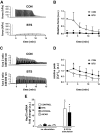Cytosolic calcium transients are a determinant of contraction-induced HSP72 transcription in single skeletal muscle fibers
- PMID: 26869714
- PMCID: PMC4867320
- DOI: 10.1152/japplphysiol.01060.2015
Cytosolic calcium transients are a determinant of contraction-induced HSP72 transcription in single skeletal muscle fibers
Abstract
The intrinsic activating factors that induce transcription of heat shock protein 72 (HSP72) in skeletal muscle following exercise remain unclear. We hypothesized that the cytosolic Ca(2+) transient that occurs with depolarization is a determinant. We utilized intact, single skeletal muscle fibers from Xenopus laevis to test the role of the cytosolic Ca(2+) transient and several other exercise-related factors (fatigue, hypoxia, AMP kinase, and cross-bridge cycling) on the activation of HSP72 transcription. HSP72 and HSP60 mRNA levels were assessed with real-time quantitative PCR; cytosolic Ca(2+) concentration ([Ca(2+)]cyt) was assessed with fura-2. Both fatiguing and nonfatiguing contractions resulted in a significant increase in HSP72 mRNA. As expected, peak [Ca(2+)]cyt remained tightly coupled with peak developed tension in contracting fibers. Pretreatment with N-benzyl-p-toluene sulfonamide (BTS) resulted in depressed peak developed tension with stimulation, while peak [Ca(2+)]cyt remained largely unchanged from control values. Despite excitation-contraction uncoupling, BTS-treated fibers displayed a significant increase in HSP72 mRNA. Treatment of fibers with hypoxia (Po2: <3 mmHg) or AMP kinase activation had no effect on HSP72 mRNA levels. These results suggest that the intermittent cytosolic Ca(2+) transient that occurs with skeletal muscle depolarization provides a sufficient activating stimulus for HSP72 transcription. Metabolic or mechanical factors associated with fatigue development and cross-bridge cycling likely play a more limited role.
Keywords: ATP; Ca2+; HSP70; O2; RTq-PCR; exercise; fatigue; gene.
Copyright © 2016 the American Physiological Society.
Figures



References
-
- Abruzzo PM, Esposito F, Marchionni C, di Tullio S, Belia S, Fulle S, Veicsteinas A, Marini M. Moderate exercise training induces ROS-related adaptations to skeletal muscles. Int J Sports Med 34: 676–687, 2013. - PubMed
-
- Amorim FT, Yamada PM, Robergs RA, Schneider SM, Moseley PL. The effect of the rate of heat storage on serum heat shock protein 72 in humans. Eur J Appl Physiol 104: 965–972, 2008. - PubMed
-
- Barash IA, Mathew L, Ryan AF, Chen J, Lieber RL. Rapid muscle-specific gene expression changes after a single bout of eccentric contractions in the mouse. Am J Physiol Cell Physiol 286: C355–C364, 2004. - PubMed
-
- Breen EC, Johnson EC, Wagner H, Tseng HM, Sung LA, Wagner PD. Angiogenic growth factor mRNA responses in muscle to a single bout of exercise. J Appl Physiol 81: 355–361, 1996. - PubMed
-
- Carmeli E, Beiker R, Maor M, Kodesh E. Increased iNOS, MMP-2, and HSP-72 in skeletal muscle following high-intensity exercise training. J Basic Clin Physiol Pharmacol 21: 127–146, 2010. - PubMed
Publication types
MeSH terms
Substances
Grants and funding
LinkOut - more resources
Full Text Sources
Other Literature Sources
Research Materials
Miscellaneous

